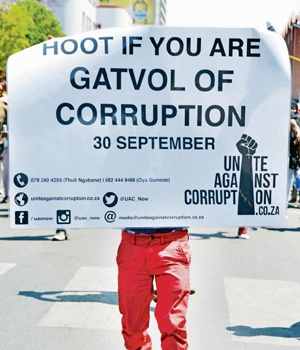
We cannot afford to wait for new appointments at the Hawks and the NPA to find their feet and for more expert staff to be recruited. It's crunch time in South Africa, we need to move faster, writes Max du Preez.
Angelo Agrizzi's testimony before the Zondo Commission did not involve the spectacular capture of entire state-owned enterprises, interference with the appointment of Cabinet ministers or a R5bn commission on train purchases. And yet his more mundane stories of gifts of liquor and groceries and monthly bribes to officials and politicians seem to have made a huge impact, a last straw of sorts in the public sphere.
We South Africans have suspected that corruption and bribery were fairly widespread, but Agrizzi's tales made it sink in for the first time how utterly commonplace it has become; they made us suspect that virtually all tenders and transactions between the state and the private sector are dubious.
And we're finally sick of it. Gatvol. My hard-earned tax is lining the pockets of greedy crooks. The Guptas have fled the country and Jacob Zuma is cornered, but the Bosasa type of shenanigans will remain with us. How many other Bosasas are there?
READ: Adriaan Basson - Is this why Bosasa was never prosecuted?
I tweeted yesterday: "What SA now needs, is a massive clean-up operation like Operation Car Wash in Brazil where some 200 people were indicted and 100 convicted of bribery and corruption, many in very high places." Within hours, more than two thousand people had retweeted it and a thousand "liked" it on my timeline alone.
There were also a few voices pointing out that Operation Car Wash had been politically abused. Benjamin Fogel, a South African living in Brazil and researching this very phenomenon, responded: "No, we really don't. Operation Car Wash was a politically driven right-wing project that more or less brought the fascist Jair Bolsonaro into power, in return its leading figure Sergio Moro was given a ministry with enhanced powers. We need to do better than Brazil."
A good red light to flash, I suppose. I actually meant the size of the Brazilian anti corruption campaign rather than how it was conducted. There are certainly risks, but I would make the point that South Africa is different: we're a constitutional rather than parliamentary democracy; our civil liberties and the rule of law are entrenched in the Bill of Rights in our formidable constitution which is guarded over by a very independent and assertive Constitutional Court; our history, demographics and class structures are very different from Brazil's; our civil society is very progressive and pro-active and our media very alert.
We cannot actually afford to wait for new appointments at the Hawks and the National Prosecuting Authority (NPA) to find their feet and for more expert staff to be recruited. It's crunch time in South Africa, we need to move faster. The slower our economic growth, the more crucial it becomes that every cent be used properly to alleviate poverty and inequality.
News24 editor Adriaan Basson showed this week that he and others have been exposing Bosasa's corruption for years, yet no-one has been prosecuted. Constitutional lawyer Pierre de Vos remarked that it was "surprising that the Hawks have not yet (as far as we know) applied for search and seizure warrants to search the Bosasa premises as well as any other places (including his home) where Gavin Watson may be hiding evidence. Neither (as far as we know) have the Hawks applied warrants to search the offices and homes of those politicians and officials like Jacob Zuma allegedly implicated in Agrizzi's testimony".
Citizens demand action
Not good enough. The good tax paying citizens are angry that corruption is tearing at the fabric of our society and sabotaging our children's future, and demand action. Action not only to stop bribery and fraud in national government, but the corruption that has virtually destroyed the most of our local governments, where citizens feel the influence of the state first. We do need a special campaign, a special task force aided by lawyers, accountants and forensic investigators seconded by the private sector, to be unleashed on corruption. And yes, one that will strictly remain inside the parameters of our laws and civil liberties, one that will be immune to selective prosecutions and political manipulation.
Is there anyone who has watched deputy chief justice Raymond Zondo conduct his inquiry who doesn't believe that he is a man of absolute integrity, steering his commission carefully and meticulously? Anybody out there thinks that he can be manipulated? I don't think so.
In the absence of a special task force, two other developments could make a dent: a dramatic increase in the number of whistleblowers, and a few high-profile politicians, civil servants and corrupt business people being led in orange overalls through the gates of prison while the television cameras are rolling.
Agrizzi's appearance before Zondo could help encourage more whistleblowers in the civil service and in private companies to come forward. Whistleblowing is an early warning system in every organisation, the first line of attack on corruption. To blow the whistle on abuse and corruption is an act of moral bravery and patriotism, although the motivation is often spite or revenge.
READ: Ralph Mathekga - Guarding against the Bosasa effect
Whistleblowers enjoy considerable legal protection via the Protected Disclosures Act, but it remains a risky thing to do and some whistleblowers have even been killed. The legal requirement that whistleblowers must first exhaust internal channels before reporting abuse to outsiders makes it even trickier. (Corruption Watch provides ways for people to blow the whistle while remaining anonymous.)
I sense the public culture of tolerance of corruption in South Africa is rapidly shifting. The public should now push harder for more decisive action during this time when political parties are vying for our support when we go to the ballot box in May.




 Publications
Publications
 Partners
Partners























